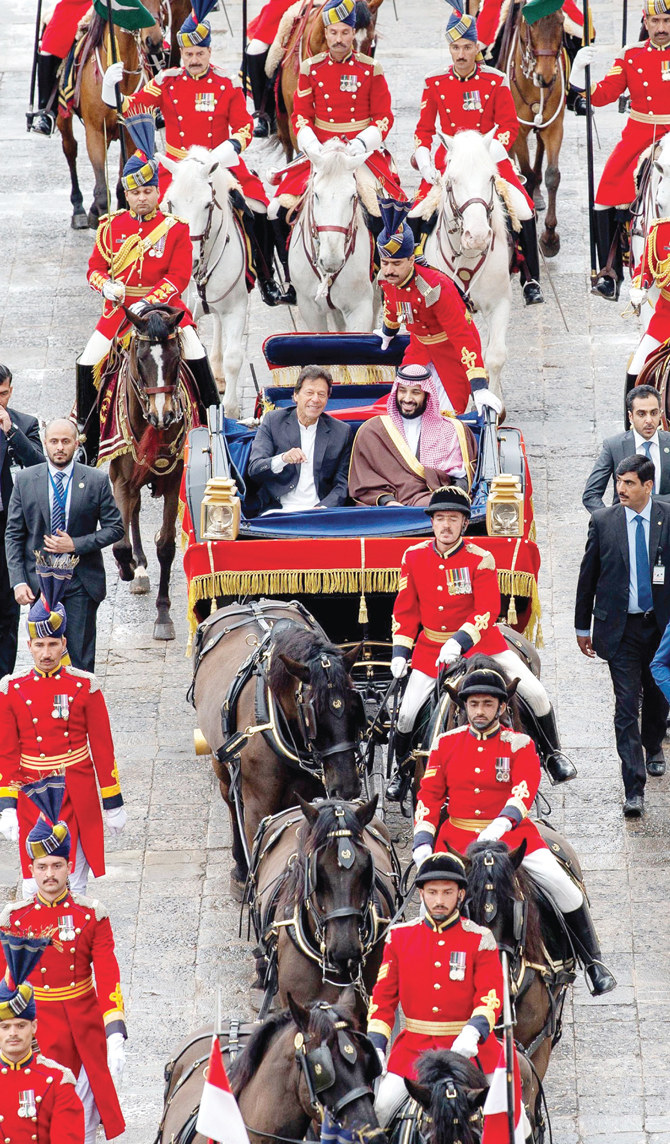The visit to Pakistan by Saudi Crown Prince Mohammed bin Salman in February this year, during which he described himself as “the ambassador of Pakistan in Saudi Arabia,” not only won the hearts of Pakistanis but also reflected his desire to take the relationship between the nations to a new level.
Prime Minister Imran Khan’s vision for transforming Pakistan, inspired by the state of Madinah, matches the ambition of Saudi Vision 2030, which aims to open up Saudi society to reflect modern realities, while at the same time maintaining its Islamic ideology.
The desire to add a new dimension to the relationship between the Kingdom and Pakistan is based on this compatibility of the two leaders’ visions for transformational change, so that governance can cope with emerging challenges.
FASTFACT
Pakistani diplomatic missions in Saudi Arabia are following business plans that emphasize the ways and means to improve bilateral trade and investment.
For a nation to progress, it must prepare a coherent road map for action, and also adopt strategies to implement the policies that will lead to its objectives. Hence Pakistan has plotted a fast, progressive route to achieve the government’s vision for “Naya Pakistan” (new Pakistan), which is designed to represent an aspirational approach.
It serves as a motivational guide for the development of an effective strategy, as well as a road map for the realization of the country’s national goals and aspirations.
Similarly, the Saudi Government is following its “Vision 2030” plan, which was launched under the visionary leadership of King Salman and the crown prince. It aims to transform the Saudi economy and diversify sources of income to reduce the current dependence on oil.
Vision 2030 is a plan to reform the entire economic structure of Saudi Arabia by decreasing public spending and placing a greater emphasis on the private sector.
HIGHLIGHTS
The Pakistani Consulate is working to ensure Saudi buyers have easy access to information about Pakistani products and services.
These include traditional exports such as food, textiles, leather, sporting goods and surgical instruments, along with more recent offerings such as pharmaceuticals, furniture, construction materials and the emerging services sector.
Credible exporters coordinate with the consulate to offer exports and quality products at competitive prices.
It also envisages links with international markets, offering win-win situations for prospective partners, especially in countries such as Pakistan that have a history of a strategic relationship with the Kingdom.
In line with the above strategy, Pakistani diplomatic missions in Saudi Arabia are following business plans that emphasize the ways and means to improve bilateral trade and investment.
These plans seek opportunities for joint ventures in the manufacturing and services sectors and strive for the development of human resources, which will not only contribute to the host country’s economy but also pay dividends for Pakistan.
They also focus on activities that not only highlight Pakistan’s potential for trade and investment, together with its friendly industrial and investment regime, but also enhance the understanding of the China-Pakistan Economic Corridor and the economic opportunities it offers.
Development partner
As a development partner of Saudi Arabia, the Pakistani Consulate is working to ensure Saudi buyers have easy access to information about Pakistani products and services.
These include traditional exports such as food, textiles, leather, sporting goods and surgical instruments, along with more recent offerings such as pharmaceuticals, furniture, construction materials and the emerging services sector.
Credible exporters coordinate with us to offer exports and quality products at competitive prices. This not only gives value for money but also helps to develop long-term relationships.
To help achieve the goal of industrialization under Vision 2030, our trade mission is also developing a business model to help develop the Saudi manufacturing sector by supplementing Saudi capital investment with technology and skilled manpower from Pakistani counterparts.
These joint venture partners will not only contribute to the domestic Saudi market but also export to others in the region. It is a win-win situation: Increased industrialization in the Kingdom, and economic benefits for Pakistan in the form of profits and the export of skilled human resources, with a resultant increase in remittances.
The Saudization aspect of Vision 2030 is a structural adjustment to the Kingdom’s services sector.
In the short term, this will result in a decline in remittances to a number of countries, including Pakistan, where money sent from Saudi Arabia makes up the lion’s share of the transfers from overseas workers.
In the long term, however, it will only change the dynamics of the human resources requirements, offering Pakistan an opportunity to upscale its manpower exports to include more skilled and managerial levels, inevitably boosting remittances as a result.
We are working with the government of Pakistan to develop specialized vocational training institutes to teach the technical skills that will be required after Vision 2030.
By the time the structural adjustments are completed in the Kingdom, Pakistani workers will be ready to fill positions at the required job levels and maintain, if not increase, remittance levels.
Efforts are also underway to broaden the areas of mutual cooperation under the umbrella of a joint ministerial commission examining the fields of educational and scientific research, avoidance of double taxation and the prevention of tax evasion, development of trade in services, manpower training by the National Training Bureau of Pakistan, a bilateral investment protection treaty, and cooperation on tourism and cultural promotion.
• Muhammad Shahzad is commercial counselor at the Pakistani Consulate in Jeddah.
















